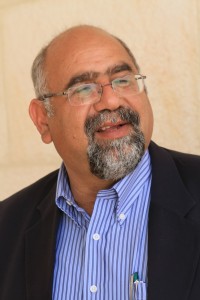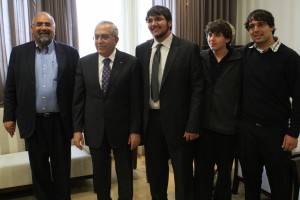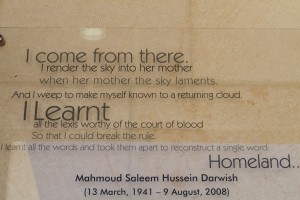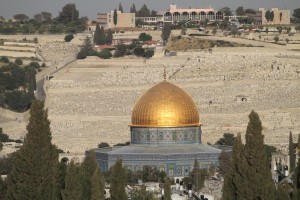Our final day in the Middle East, for this journey anyway, by Gerri Haynes
(Gerri Haynes, a former president of Washington Physicians for Social Responsibility, is once again sending back reports from inside blockaded Gaza. As she did four times before, Gerri has organized a team of doctors and other health care providers to work in hospitals and clinics in Gaza in an effort to directly help the people there and to bring attention to the ongoing humanitarian crisis that the Israeli blockade has created. Twelfth, and last, in the series.)
Our final day in the Middle East for this journey. As we prepared to travel north by bus to Ramallah, Lucas and Rafiq Zoughbi joined us. At the outer rim of Ramallah, we were in touch with Zoughbi Zoughbi by phone and then stopped to pick up Zoughbi and his nephew, Rajaii, who waited for us at the edge of the road. Travel to Jerusalem from Bethlehem is forbidden to those who have neither special permission nor a Jerusalem identification card. We were so happy to see Zoughbi again and thanked him for arranging another day for us.
We stopped our bus to speak with a group of people protesting the treatment of Palestinians imprisoned in Israel. More than 2000 prisoners are presently on a hunger strike – many are held without charge in administrative detention. After fortifying ourselves with ice cream from a local specialty store, we wandered, somewhat lost, through the streets of Ramallah – first in the bus and then on foot.
The good nature of the Zoughbi family buoyed us and we arrived for our appointment with Prime Minister, Salem Fayed. What a
delight to hear from him about his hopes for medical care in Palestine. An optimist, Mr. Fayed detailed a positive future for Palestine. We told him of our time in Gaza. With no denial of the difficulties now faced with finances and possible statehood, he detailed the small amount of tax money presently received from Gaza and the expenditures on Gaza by the Palestinian Authority of at least 10 times the amount received in taxes from them.Following our visit with the Prime Minister, we visited the new memorial to Palestinian poet Mahmoud Darwish. A museum is scheduled to open soon on this site and we were delighted to
have had a time to see this beautiful structure.We bid farewell to the Zoughbis when we arrived at our hotel and, after a quick supper, many from our group made quick visits to the Old City.
Soon, we will return to the airport near Tel Aviv to go through the intense security screening and return home. We are blessed to have had this time in this beautiful, conflicted land.
***********
“TO BE HOPEFUL in bad times is not just foolishly romantic. It is based on the fact that human history is a history not only of cruelty, but also of compassion, sacrifice, courage, kindness.
What we choose to emphasize in this complex history will determine our lives. If we see only the worst, it destroys our capacity to do something. If we remember those times and places—and there are so many—where people have behaved magnificently, this gives us the energy to act, and at least the possibility of sending this spinning top of a world in a different direction.
And if we do act, in however small a way, we don’t have to wait for some grand utopian future. The future is an infinite succession of presents, and to live now as we think human beings should live, in defiance of all that is bad around us, is itself a marvelous victory.” ― Howard Zinn
RSS feed for comments on this post. TrackBack URI



